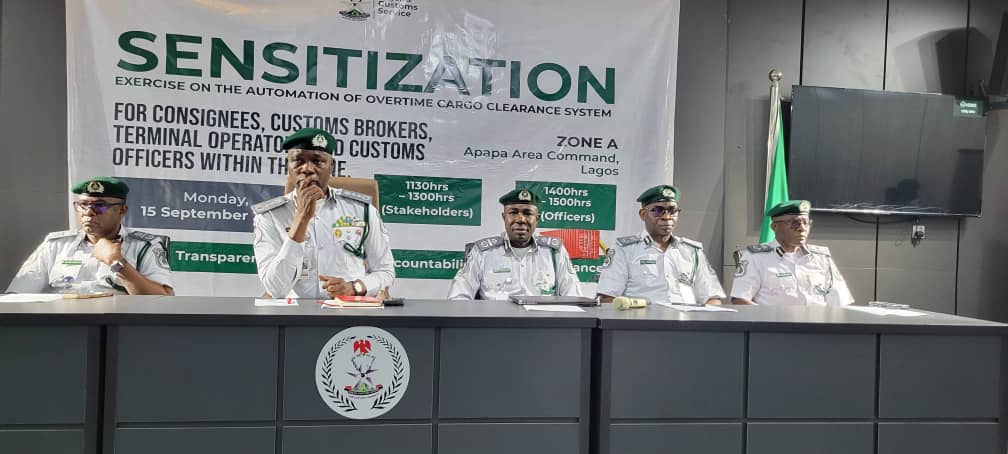In a bid to decongest the nation’s ports and boost transparency, the Nigeria Customs Service (NCS) has introduced an automated system for clearing overtime cargo at the nation’s ports.
The new measure, according to the NCS, aims to streamline clearance process, reduce human interface, and ensure transparency in the disposal of overtime cargo.
Under the new system, the NCS says consignees can now apply for an additional 90-day extension, as provided by Section 30(1) of the NCSA 2023 after the initial deadline of 30 days cargo dwell time.
The NCS explained that after this extended period, any uncleared goods will be subject to the new automated disposal process to create space for new imports and prevent subsequent port congestion.
Speaking at the sensitization exercise for stakeholders, including customs brokers, terminal operators, and consignees, in Lagos on Monday, Comptroller General of Customs, Adewale Adeniyi, revealed that more than 50% of the daily complaints he receives are related to the management of overtime cargo.
He said, “Our objectives for deploying the system include to facilitate trade, to get imported goods to their owners. And more importantly, we want to manage space so that other imports that are coming can have space in our ports and then they can be cleared in a very swift manner. So this system will be deployed and we will appreciate the feedback that we are going to be getting from our stakeholders.”
Adeniyi stressed that the primary goal is not revenue generation, as revenue from overtime cargo sales accounts for less than 1% of the NCS’s total revenue.
“I need to reiterate and reemphasize the fact that revenue is not the aim. It is not the objective of what we are doing.
“The objective is to inject transparency, to reduce corruption, and make the system more efficient. And I want to give you an example. In 2024, our revenue profile rose to N6.3 trillion. Less than 1% of that was taken from the sales of over time cargo. So our objective is not about making revenue, ” he said.
To ensure critical imports are not delayed, Adeniyi said the NCS has created specialized desks to manage consignments for government agencies, the private sector, and diplomatic missions.
“One of the things that I have done was to set up specialized desks at headquarters and in different commands to manage imports done by government and government agencies. We don’t want those imports to stay longer in our ports.
“Projects that address issues of power infrastructure, road infrastructure, public health, education. All of those projects are very vital to delivering the dividend of democracy to Nigerians. And we would not want them to be abandoned in the port, to stay longer in our ports. And irrespective of their status, the directive I always give to all our controllers is that we must weigh all processes and procedures and ensure that those consignments are taken out of our ports.
“The same goes for consignments imported by members of the organized private sector and the Manufacturers Association of Nigeria and other organized groups. We know that through these imports they reflect our economy and we don’t want them to be delayed in our ports. We also give reference to our embassies and consignments that are imported by international organizations, missions and diplomatic agencies.
So we also have special desks that have been created for them, ” he said.
Adeniyi also warned that the NCS is aware of criminal elements who may try to exploit the new system.
He assured stakeholders that the system is configured to shut out those who do not have legitimate claim and that intelligence units will be on the look out to prevent to prevent criminal elements from sabotaging the process.
In his welcome address, Assistant Comptroller General of Customs in charge of Headquarters, Isah Umar, said the new automated system will harmonize the process and procedures involved in the clearance and disposal of overtime cargo by improving data integrity and reducing human interaction.
He added that the automation will build public confidence in the NCS, and significantly cut down on complaints.
Stakeholders present at the meeting including the
Vice President of the Association of Nigerian Licensed Customs Agents (ANLCA), Prince Segun Oduntan commended the initiative, saying it will help alleviate port congestion.
Oduntan urged customs to remain vigilant against criminal elements who might try to exploit the system.
He also urged the NCS to ensure that consignees who deliberately abandon their cargo do not benefit from the new system.
“Any consignee who abandon or deliberately leave his cargo in the terminal, should not be the beneficiary,” Oduntan said.

